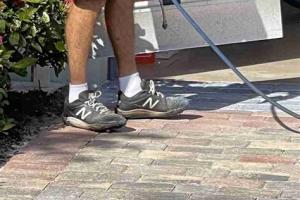Ultimate Guide: How to Seal Pavers for Longevity and Beauty

-
Quick Links:
- 1. Introduction
- 2. Why Seal Pavers?
- 3. Types of Pavers
- 4. When to Seal Pavers
- 5. How to Seal Pavers: Step-by-Step Guide
- 6. Choosing the Right Sealer
- 7. Maintenance Tips for Sealed Pavers
- 8. Common Mistakes to Avoid
- 9. Case Studies: Successful Paver Sealing
- 10. Expert Insights on Paver Sealing
- 11. FAQs
1. Introduction
Pavers are a popular choice for outdoor spaces, providing both functionality and aesthetic appeal. However, exposure to the elements can lead to wear and tear over time. One effective way to protect your investment is by sealing your pavers. This comprehensive guide will walk you through everything you need to know about sealing pavers, from the benefits to the step-by-step process and expert insights.2. Why Seal Pavers?
Sealing pavers has several advantages: - **Increased Longevity**: A good sealer protects pavers from moisture, oils, and stains, extending their lifespan. - **Enhanced Appearance**: Sealers can enhance the color and finish of pavers, making them look brand new. - **Preventing Weeds and Insects**: Sealing creates a barrier that reduces weed growth and insect infestation. - **Ease of Maintenance**: Sealed surfaces are easier to clean, requiring less frequent upkeep.3. Types of Pavers
Understanding the different types of pavers is crucial for choosing the right sealing method: - **Concrete Pavers**: Durable and versatile; often used for driveways and patios. - **Brick Pavers**: Classic and stylish; require special care to maintain color and integrity. - **Natural Stone Pavers**: Unique and elegant; sealing helps preserve their natural beauty.4. When to Seal Pavers
Timing is essential when sealing pavers: - **New Pavers**: Wait at least 30 days after installation to allow for proper curing. - **Existing Pavers**: Seal during dry weather, ideally in spring or fall when temperatures are moderate. - **Environmental Conditions**: Avoid sealing during rain or extreme heat to ensure proper adhesion.5. How to Seal Pavers: Step-by-Step Guide
Sealing pavers is a straightforward process if done correctly. Follow these steps: 1. **Gather Your Materials**: - Paver cleaner - Pressure washer or hose - Broom - Sealer (choose the right type based on your paver material) - Paint roller or sprayer - Safety gear (gloves, mask) 2. **Clean the Pavers**: - Remove all debris with a broom. - Use a pressure washer to remove dirt and stains. - Allow the pavers to dry completely. 3. **Apply Joint Sand**: - If necessary, reapply joint sand to fill gaps between pavers. 4. **Select and Prepare the Sealer**: - Choose a sealer appropriate for your paver type. - Follow the manufacturer’s instructions for mixing and preparing the product. 5. **Seal the Pavers**: - Use a paint roller or sprayer to apply the sealer evenly. - Work in small sections, ensuring uniform coverage. 6. **Allow to Dry**: - Let the sealer dry according to the manufacturer’s instructions. 7. **Final Inspection**: - Check for missed spots and apply a second coat if necessary.6. Choosing the Right Sealer
Selecting the appropriate sealer is crucial for your paver’s aesthetics and durability. Consider the following: - **Type of Sealer**: - Penetrating sealers are ideal for natural stone pavers. - Film-forming sealers provide a glossy finish but may require more maintenance. - **Environmental Impact**: Look for eco-friendly options that minimize environmental harm. - **Cost**: Prices can vary widely, so consider your budget alongside the quality of the product.7. Maintenance Tips for Sealed Pavers
To keep your pavers looking great after sealing: - **Regular Cleaning**: Sweep and wash regularly to prevent dirt buildup. - **Reapply Sealant**: Depending on exposure, reseal every 1-3 years. - **Check for Damage**: Inspect pavers regularly for cracks or stains and address them promptly.8. Common Mistakes to Avoid
Avoid these pitfalls when sealing pavers: - **Sealing Too Soon**: Ensure pavers are completely dry before sealing. - **Using the Wrong Sealer**: Match the sealer to your paver material. - **Neglecting Maintenance**: Regular upkeep is essential for longevity.9. Case Studies: Successful Paver Sealing
**Case Study 1**: *The Johnson Family's Patio* After sealing their new concrete pavers, the Johnsons reported a 30% reduction in moss growth and an enhanced color vibrancy. **Case Study 2**: *Local Park Renovation* A community park used high-quality sealers that increased the lifespan of their brick pavers, reducing maintenance costs by 40% over five years.10. Expert Insights on Paver Sealing
According to landscape expert Dr. Jane Smith, “Regular sealing not only protects your investment but also adds value to your property. Choosing the right products is key to achieving lasting results.”11. FAQs
- 1. How often should I seal my pavers? - Every 1-3 years, depending on wear and environmental conditions.
- 2. Can I seal wet pavers? - No, pavers must be completely dry before sealing.
- 3. What happens if I skip sealing? - Unsealed pavers are vulnerable to stains, weeds, and discoloration.
- 4. Is sealing pavers necessary? - While not mandatory, sealing significantly enhances durability and appearance.
- 5. Can I apply a sealer over an old sealer? - Yes, but ensure the old sealer is compatible and in good condition.
- 6. What tools do I need to seal pavers? - Basic tools include a broom, pressure washer, and applicator.
- 7. Will sealing make my pavers slippery? - Some sealers can increase slip resistance; check product specifications.
- 8. How can I tell if my pavers need sealing? - Look for dullness, stains, or discoloration.
- 9. Can I seal pavers myself? - Yes, it’s a feasible DIY project with proper preparation.
- 10. Are there eco-friendly sealers available? - Yes, many brands now offer environmentally safe options.
For further reading and reference, check out these authoritative sources:
Random Reads